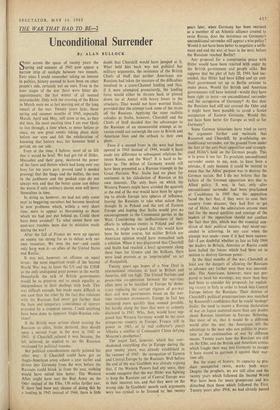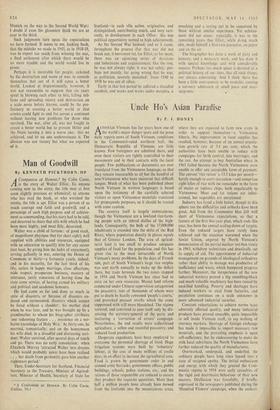THE WAR THAT HAD TO BE-2
Unconditional Surrender
By ALAN BULLOCK
SEEN across the space of twenty years the spring and summer of 1945 now appear a narrow strip of sunlight between two tunnels. Ever since I could remember taking an interest in politics, history seemed to have been on other people's side, certainly not on ours. Even in the later stages of the war there were bitter dis- appointments; the last winter of all seemed interminable. Only with the crossing of the Rhine in March were we at last moving out of the long tunnel of the war. Twenty years later, those spring and summer months of 1945, especially March", April and May, still seem to me, as they did then, the most exciting time I am ever likely to live through, a time when, as never before or since, we saw great events taking place daily before our eyes and felt the exhilaration of knowing that history was, for however brief a period, on our side.
Even at the time, I believe, most of us felt that it would be brief. We had got rid of Hitler, Mussolini and their gang, shattered the power of the fears and threats which had hung over our lives for ten years past, proved (and it needed proving) that the thugs and the bullies, the men in the jackboots and the peaked caps do not always win and that the better cause can defeat the worse if only ordinary decent men will bestir themselves in time.
In doing so, however, we had not only come near to beggaring ourselves but become involved in new problems which, within a very short time, were to appear as threatening as those which we had just put behind us. Could these have been avoided? To what extent have our post-war troubles been due to mistakes made during the war?
After the fall of France we were up against an enemy too strong for us to defeat with our own resources. We won the war—and could only hav, won it—as allies of the United States and Russia.
It was not, however, an alliance on equal terms: the most important result of the Second World War was to leave the US and the USSR as the only undisputed great powers in the world. Henceforth the task of British governments would be to preserve not so much equality as independence in their dealings with both. This Was difficult enough, but made more difficult in one case than the other by the fact that relations with the Russians had never got further than the bare and temporary coincidence of interest provided by a common enemy. Could anything have been done to improve Anglo-Russian rela- tions?
If the British were serious about treating the Russians as allies, Stalin declared, they should open a second front in the west in 1942 or 1943: if Churchill refused it was because, the left believed, he wanted to see the Russians weakened for political reasons.
But political considerations surely pointed the other way: if Churchill could have got an Anglo-American army ashore a year earlier and driven into Germany from the west before the Russians could break in from the east, nothing would have suited him better. The Western Allies might have met the Red Army on the Oder instead of the Elbe, 150 miles farther east. If there had been any chance of doing this by a landing in 1943 instead of 1944, there is little doubt that Churchill would have jumped at it. What held him back was not political but military arguments, the insistence of the British Chiefs of Staff that neither Americans nor Russians had taken the measure of the difficulties involved in a cross-Channel landing and that, if it, were attempted prematurely, the landing force would either be thrown back or pinned down (as at Anzio) with heavy losses to the attackers. That would not have worried Stalin, provided that the attempt took some of the strain off the Russians. Applying the same realistic calculus as Stalin, however, Churchill and the Chiefs of Staff decided that the advantages to the Russians of an unsuccessful attempt at in- vasion could not outweigh the cost in British and American lives and the setback to their own plans.
Even if a second front in the west had been opened in 1943 instead of 1944, would it have made any difference to subsequent relations be- tween Russia and the West? It is hard to be- lieve so. The defeat of Germany would still have been presented as a Russian triumph in the Great Patriotic War. Stalin had no place for sentiment in his calculation of Russian or his own interests. The only basis on which the Western Powers might have avoided the quarrels at the end of the war would have been by agree- ing to divide Europe into spheres of influence, leaving the Russians to take what action they thought fit in Poland and the rest of Eastern Europe and hoping that Stalin would give no encouragement to the Communist parties in the West. Considering the ineffectiveness of their efforts to influence events in Poland and else- where, it might be argued that this would have been the better course, but neither British nor American opinion would have stomached such a solution. When it was discovered that Churchill and Stalin had reached a local agreement along these lines for Greece and the Balkans, there were loud protests at so 'unprincipled' an act of Realpolitik.
Twenty years ago hopes of a New ,Deal in international relations, at least in Britain and America, still ran high. The United Nations and peace-time co-operation between the war-time allies were to be matched in Europe by demo- cracy replacing the corrupt regimes of pre-war days and new governments based on the war- time resistance movements. Europe in fact has recovered more quickly than seemed possible, but hardly along the lines that were so ardently discussed in 1945. Who, then, would have sup- posed that Western Germany would be the most prosperous country in Europe, Franco still in power in 1965, or (a real collector's piece) Albania a satellite of Communist China defying Moscow's anathemas?
• The major fact, however, which has over- shadowed everything else in Europe during the past twenty years, was already established in the summer of 1945: the occupation of Eastern and Central Europe by the Russians. Well before the end of the war Goebbels was already arguing that, if the Western Powers had any sense, they would recognise that the war Hitler was fighting to keep the Russiani out of Central Europe was in their interests too, and that they were on the wrong side. In Goebbels' mouth such arguments were too cynical to be listened to; but twenty years later, when Germany has been rearmed as a member of an Atlantic alliance created to resist Russia, does the insistence on Germany's unconditional surrender still appear a wise policy? Would it not have been better to negotiate a settle- ment and end the war, at least in the west, before the Russians reached Berlin?
Any proposal for a compromise peace with Hitler would have been rejected with anger by the British government and people alike. But suppose that the plot of July 20, 1944, had suc- ceeded, that Hitler had been killed and an anti- Nazi government set up in Berlin anxious to make peace. Would the British and American governments still have insisted—would they have been right to insist—on unconditional surrender and the occupation of Germany? At that date the Russians had still not crossed the Oder and it might have been possible to avoid a Soviet occupation of Eastern Germany. Would this not have been better for Europe as well as for Germany?
Some German historians have tried to carry the argument further and maintain that Roosevelt and Churchill, by proclaiming un- conditional surrender, cut the ground from under the feet of the anti-Nazi opposition and strength- ened Hitler's hold on the German people. This is to press it too far. To proclaim unconditional surrender seems to me, now, to have been a mistake, if only because it could be twisted to mean that the Allies' purpose was to destroy the German nation. But I do not believe that the failure of the German opposition was due to Allied policy. It was, in fact, only after unconditional surrender had been proclaimed at Casablanca in 1943 that the opposition faced the fact that, if they were to save their country from disaster, they had first to get rid of Hitler. And the admiration anyone must feel for the moral qualities and courage of the leaders of the opposition should not confuse the fact that this, which was the essential con- dition of their political success, they never suc- ceeded in achieving. In any case when the attempt was made—even if it had been success- ful—I am doubtful whether as late as July 1944 the leaders in Britain, America or Russia could have halted the forces which had been set in motion to destroy German power.
In the final months of the war, Churchill at least saw the dangers of allowing the Russians to advance any farther west than was unavoid- able. The Americans, however, were not pre- pared to heed his warnings, any more than they had been to consider his proposals for exploit- ing victory in Italy in order to break into Central Europe before the Russians. Their distrust of Churchill's political preoccupations was matched by Roosevelt's confidence that he could 'manage' Stalin; the need to secure a Russian declaration of war on Japan mattered more than any doubts about Russian intentions in Europe. Believing, like most of us, that it would be a different world after the war, the Americans left the advantage to the man who saw politics in peace- time as the continuation of war by different means. Twenty years later the Russians are still on the Elbe, and the British and American armies which fought their way into Germany to occupy it have stayed to garrison it against their war- time ally.
But the irony of history, its capacity to pro- duce unexpected twists, works both ways. Despite the prophets, we are still alive and the twenty years which followed the Second World War have been far more prosperous and less disturbed than those which followed the First. Twenty years after 1918, we had already passed
Munich on the way to the Second World War:' I doubt if even the gloomiest think we are as near to the third.
Such judgments turn upon the expectations we have formed. It seems to me, looking back, that the mistake we made in 1945, as in 1918-19, was to expect too much from winning the war, a final settlement after which there would be no more trouble and the world would live in peace.
Perhaps it is inevitable for people, sickened by the destruction and waste of war, to console themselves that out of it will come a better world. Looked at dispassionately, however, it was not reasonable to suppose that six years spent in blowing each other to bits, killing mil- lions and spreading misery and destruction on a scale never before known, could be the pre- liminary to creating a better world or that armies could fight to and fro across a continent without leaving new problems for those who survived. The war, after all, was not fought to create a better world but to prevent Hitler and the Nazis turning it into a worse one: this we achieved, and let no one underestimate it. The illusion was not victory but what we expected of it.



































 Previous page
Previous page